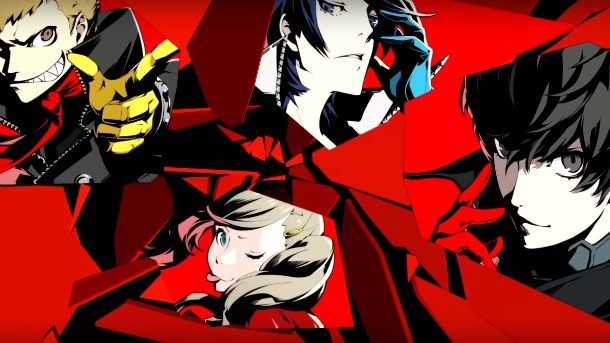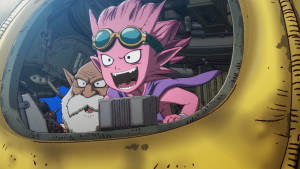Please support Game Informer. Print magazine subscriptions are less than $2 per issue
The Virtual Life – 2017's Best Games Were About Resistance

2017 has been a long year. The longest in my life, it's felt like. I've woken up a lot of mornings, made coffee, and then read one headline after another, each leaving their dizzying, devastating impact. Possible war on the horizon. Discrimination in spades. The continued downplay of the dangers of climate change. The death of one of my heroes. A bevy of personal, medical, and emotional issues haven't exactly made things bright and sparkly. If I were superstitious, I'd tell you there's something wrong with this year. That it's cursed, rancid. A year of anger and distrust and fear.
It's year where I feel like I've sleepwalked most days, bouncing between feeling powerless and delusionally powerful. This is a feeling I know many people share but don't talk about. What's the use in giving it a voice, all the dread and fear and anxiety? I've never found much comfort in talking with other people about fears. Writing about them, sure. You're just talking to a bunch of white space and then people happen to read your conversation with the white space and have opinions about it. But talking with real people? About being scared of dying, of economic catastrophe, of failed ambitions, of all those little dreadful, murderous thoughts that sneak into your brain in the dead of night? Not for me. I'm trying to change that, make an art out of connecting with people on an emotional level. But it's hard.
I've waffled back and forth over the power of games as therapeutic devices this past year. They're potent devices for escapism, video games, and escapism has become a sort of dirty word, this idea that we're escaping from our responsibilities or from confronting reality. There's maybe some truth to that, but I don't think that's a new thing or something that's exclusive to the world of video games, and I don't think escapism is inherently a bad thing. Too much of it? Sure. But I think great art often thematically justifies its existence, even if it has a silly veneer. Great art lifts you up and leaves you with messages that could shock you to your core or inspire you to look inward and face the day with renewed passion.

For me, the best games of 2017 were all about resistance. And I don't just mean political resistance, which has been the banner for many this year, but all kinds of resistance. In the end, resistance is about tearing down established order, especially unconscionable ones. Take, for example, Persona 5, which stars a group of high school students infiltrating the corrupted hearts of adults to make them confess their sins and turn over a new leaf. The Legend of Zelda: Breath of The Wild, my personal Game of the Year, is a title that ostensibly has no overt political message but is still an adventure that focuses on the responsibility of renewing a corrupt and broken world.
In Dishonored's Death Of The Outsider, eventually Billie ushers in a new order free of the Outsider, either through violent means or otherwise. It creates a power vacuum and the potential for further chaos, but this vacuum also allows for more people in Dishonored's world to take more control over their lives. In these games, resistance is the key tenet. Nier: Automata has its character grapple with the cruelty of their masters as they break away in search of a world to build for themselves in an attempt to break the cruel cycle of existence they're trapped in. The resistance to things that people know to be inhuman and monstrous, things that exist inside and outside of ourselves.
Of course, there were definitely a few games this year that were explicitly political resistance games. The established order in Wolfenstein II, ruled by the cruel nazi regime, must be torn down aggressively, with hatchets severing sinew and bullets bursting eyeballs because the order is built on bigotry and will not respond to reason. There is no debating this sort of power structure because it feeds on hate so in the end, Wolfenstein's manner of violent resistance is more than justified: it's deeply satisfying, especially in a year where nazis have the gall to show up at rallies to spread their garbage.

I felt a fire in my throat during certain scenes of Wolfenstein II, a grin slowly stretching out across my face as I watched protagonist BJ Blazkowicz split a Nazi's face open with a hatchet. There was glee in my heart. Yes, Wolfenstein II is an escapist fantasy, with its pulp sci-fi leanings and gleeful violence, but it's also an experience that lets me play out my ideological values against unhinged, horrific ones and, in that way, lets me reinforce them. It lets me believe that good can triumph over evil. Even if that's not the case, I need to believe it. I need to believe it so I can get up in the morning.
Everything ends, especially power structures and orders, one way or another. This is what all of mankind's stories have told us as far back as there have been stories. Armies ransacking countries, demolishing nations. Politicians backstabbing each other. People rising up to put their former masters' heads beneath guillotines. In a year where I've woken up to read headlines, pondering if the people at the controls of the nation I live in had any sense of restraint or decency, the best games that I've played weren't oh-so-serious art games that looked unflinchingly into the heart of despair or pure escapist affair, but something in between. Games that let me escape into a world but also had me grappling with larger issues of despair and hopelessness, of the possibility of restoring beautiful worlds, games that reminded me of the value of looking into the horizon for any sign of hope, hope, hope.
Escapist fantasies are just entertainment. At their best, they're skillful exercises in ideological instruction and inspiration. In the case of 2017's video games, these works all exist separate from one another obviously but they all communicate one shared message: do not give up. The world is our responsibility and it's good and useful to have media that we partake remind of us that important fact now and again. As two characters from Nier: Automata, perhaps the most powerful and uplifting interactive experience this year, say: "A future is not given to you. It is something you must make for yourself." Let us hope in the years to come, as changes take hold on a personal and global scale, that the good in each of us is more than up to the challenge of keeping the peace and that there's enough art, both in and out of games, to remind us of the worthwhileness of that struggle.











